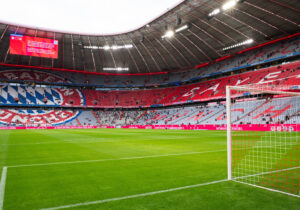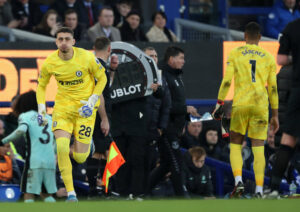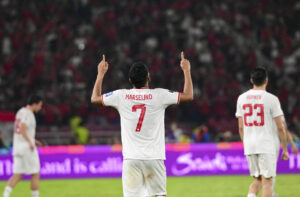Atlético Madrid win La Liga. Words in which the likeliness of them proving true were diminishing as the season progressed.
After falling behind for the second consecutive league match (this time to 19th-placed Real Valladolid), it could be forgiven if the Atlético Madrid players, coaches and supporters began to wonder if another devastating collapse was written in the stars.
Especially considering a potential defeat would enable Real Madrid to surpass them once again. Like in the 2014 and 2016 UEFA Champions League finals, when Atlético’s agonizing defeats to their city-rivals enhanced the club’s infamous “El Pupas” (“The Jinxed Ones”) mantra.
After leading La Liga by as many as 10 points in January, losing the league title on the final day would be typical for Atlético. One could even consider it the club’s destiny.
But not this year. Atlético scored twice in a ten-minute span in the second half, officially winning the Spanish league title for the 11th time in club history and first since 2014, potentially shedding their historical curse once and for all.
Atlético Madrid Win La Liga on the Last Day
How Atlético Got There
Based on Atlético’s form during the first half of the 2020/21 La Liga season, it appeared the club was on its way to a second league title under famed manager Diego Simeone. They lost only once through the first 22 matches (a 2-0 defeat at Real). Following that loss, Atlético won eight straight and accumulated a total of 50 points at the halfway point of the season.
With a stingy defence that conceded only 10 goals through the first 19 matches, along with a revitalized attack, Simeone’s men comfortably led La Liga by double-digits, with no indications that their impressive form would drop off. This, coupled with a poor start to the season by Barcelona and Madrid, established Los Rojiblancos as clear title favorites.
However, Atlético hit a poor run of form beginning in February, where in a span of three days, they drew and lost to Levante, providing their title rivals with an opening. A disappointing draw at home to Los Blancos a few weeks later (conceding in the 88th minute), began to further sow doubt as to whether the “pupas” curse would continue to haunt the club. With a loss to Sevilla and a draw to Real Betis in back-to-back matches in early April, all optimism had faded.
However, Barcelona and Madrid were unable to take advantage of Atlético’s poor run of results, with the Catalans winning only twice in their final six matches, and Real dropping points at home to Sevilla in early May. Therefore, the onus remained with Atlético, who knew if they were to win their final three matches, they would be crowned champions.
Agony and Rejoice
First, Atlético defeated fifth-placed Real Sociedad, in a hard-fought 2-1 home victory. Next came 11th-placed Osasuna, also at Atlético’s home ground, the Wanda Metropolitano. Despite dominating the match with over 70% possession, Simeone’s side could not find a breakthrough. Then, out of nowhere, Osasuna scored in the 75th minute on a headed goal by Ante Budimir, from a cross into the box. Meanwhile, Madrid were in front 1-0 against Athletic Bilbao, meaning if the results held, Atlético would end the day in second place, with the title race out of their control.
Enter Renan Lodi. A 66th-minute substitute, the left-back received a brilliant pass from Joao Felix (who also came off the bench) and thundered it into the top corner with his left foot. Simeone’s substitutions worked, but Atlético still needed another goal.
Enter Luis Suárez. The former Barcelona striker, cast away by the club last summer, made the most of his opportunity to prove his old employers wrong. Before the match, Simeone declared that Atletico were entering “The Suárez Zone,” due to the striker’s innate ability to score clutch goals throughout his career. And in the 88th minute, Osasuna and the rest of Spain discovered what that zone was. A brilliant cross into the box by Yannick Carrasco was met by Suárez, who calmly struck the ball into the net, causing pandemonium amongst his teammates and coaches. The 34-year-old Uruguayan saved Atlético’s season, but there was still one more match to go.
Finishing the Job
On paper, Atlético’s final match against Valladolid, the second-worst team in La Liga, seemed a formality. In fact, over the last 11 matches between the two sides, Atlético had won 10 of them and drawn the other. But the “pupas” curse has a way of rearing its ugly head in the most unpredictable moments.
Like in the 18th minute, when Valladolid right-winger Oscar Plano put his club ahead off a brilliant counterattack, expertly placing his shot past the outstretched arms of Jan Oblak. Once again, Atlético faced a deficit, knowing if it stayed that way, they would most likely finish in second place and lose out to their city rivals (again).
And just like against Osasuna, Simeone’s side responded. This time it was forward Angel Correa, scoring a stunning goal from outside the box in the 57th minute, built up by his brilliant movement through the Valladolid defence. Now, Atlético needed one more goal, to finally claim their title.
Ten minutes later, Atlético entered “The Suárez Zone” once again, as the striker scored off a terrible pass by Sergi Guardiola, which allowed Suárez to break free one-on-one with the goalkeeper. It was fitting Suárez scored the winner to clinch the league title, as he put together an incredible season for Atlético, with 21 league goals. None were more important than the winners against Osasuna and Valladolid. In just one year, he has become an Atlético legend.
Atlético Madrid Win La Liga in Tense Final Day Showdown
Atlético Madrid’s 2-1 victory confirmed the La Liga title, giving Simeone his second since he took over in 2011. Over the last decade, under his tutelage, Atlético have become one of the most successful clubs not just in Spain, but in all of Europe. He has won eight trophies with the club during one of the greatest periods of its history.
In the end, the football world will remember the 2020/21 Atlético team not just for winning the league and finishing ahead of both Real Madrid and Barcelona, but also for overcoming the club’s past infamous history of curses and collapses.
Main Photo






